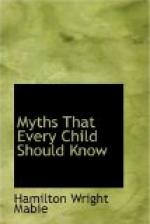Philemon and his wife turned toward the valley, where, at sunset, only the day before, they had seen the meadows, the houses, the gardens, the clumps of trees, the wide, green-margined street, with children playing in it, and all the tokens of business, enjoyment, and prosperity. But what was their astonishment! There was no longer any appearance of a village! Even the fertile vale, in the hollow of which it lay, had ceased to have existence. In its stead, they beheld the broad, blue surface of a lake, which filled the great basin of the valley from brim to brim, and reflected the surrounding hills in its bosom with as tranquil an image as if it had been there ever since the creation of the world. For an instant, the lake remained perfectly smooth. Then a little breeze sprang up, and caused the water to dance, glitter, and sparkle in the early sunbeams, and to dash, with a pleasant rippling murmur, against the hither shore.
The lake seemed so strangely familiar that the old couple were greatly perplexed, and felt as if they could only have been dreaming about a village having lain there. But, the next moment, they remembered the vanished dwellings, and the faces and characters of the inhabitants, far too distinctly for a dream. The village had been there yesterday, and now was gone!
“Alas!” cried the kind-hearted old people, “what has become of our poor neighbours?”
“They exist no longer as men and women,” said the elder traveller, in his grand and deep voice, while a roll of thunder seemed to echo it at a distance. “There was neither use nor beauty in such a life as theirs; for they never softened or sweetened the hard lot of mortality by the exercise of kindly affections between man and man. They retained no image of the better life in their bosoms; therefore, the lake, that was of old, has spread itself forth again, to reflect the sky!”
“And as for those foolish people,” said Quicksilver, with his mischievous smile, “they are all transformed to fishes. There needed but little change, for they were already a scaly set of rascals, and the coldest-blooded beings in existence. So, kind Mother Baucis, whenever you or your husband have an appetite for a dish of broiled trout, he can throw in a line, and pull out half a dozen of your old neighbours!”
“Ah,” cried Baucis, shuddering, “I would not, for the world, put one of them on the gridiron!”
“No,” added Philemon, making a wry face, “we could never relish them!”
“As for you, good Philemon,” continued the elder traveller—“and you, kind Baucis—you, with your scanty means, have mingled so much heartfelt hospitality with your entertainment of the homeless stranger, that the milk became an inexhaustible fount of nectar, and the brown loaf and the honey were ambrosia. Thus, the divinities have feasted, at your board, off the same viands that supply their banquets on Olympus. You have done well, my dear old friends. Wherefore, request whatever favour you have most at heart, and it is granted.”




